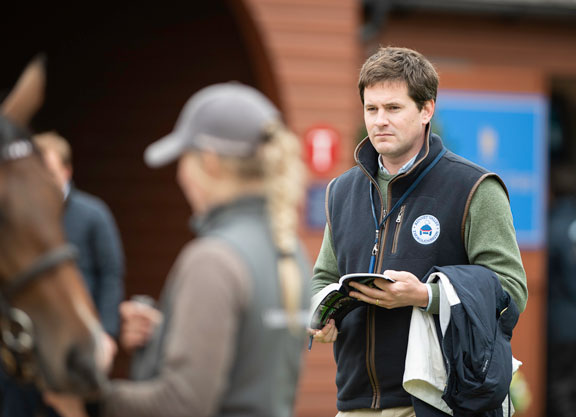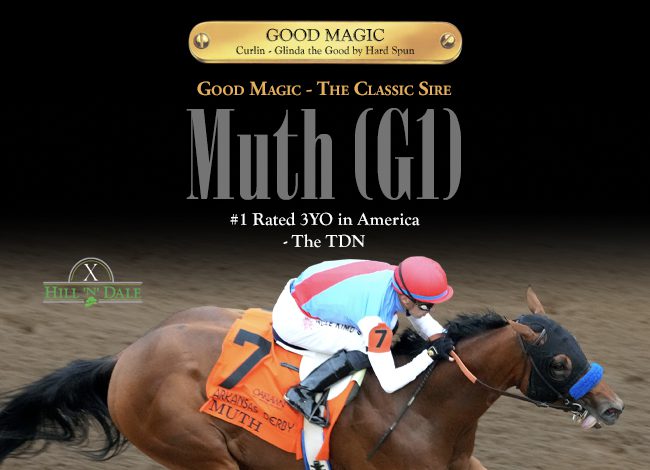By Kelsey Riley
Those that invest in racehorse ownership are typically hooked by the thrill of competition and the camaraderie that comes along with the team effort it takes to get a horse into the winner's enclosure. So what happens when those key elements are removed?
Those that stick around in the racing game would have to be resilient by nature or have developed thick skin along the way, and Sam Hoskins, a manager of syndicate groups Kennet Valley Thoroughbreds and Hot To Trot Racing, said, thankfully, his syndicate members have been game to wait out racing's postponement due to COVID-19.
“We've been extremely lucky,” Hoskins said. “A couple of people in the Kennet Valley Syndicates [generally the more expensive of the two] were struggling a bit with the spring top-ups which started in April, but we've tried to look after them as best we can and help them pay in time. But in general, apart from those couple of cases we've been extremely lucky. In general, we don't have monthly direct debit and I think for the moment we're lucky that generally they've paid up front. I suspect quite a few of our people play within their means and are fairly sensible about it, and we've been lucky as a result.”
Kennet Valley Thoroughbreds offers shares in a single horse broken down into 16 shares in the high four-figures each and has 12 horses on the books. It is best known for campaigning triple group-winning sprinter Magical Memory (Ire) (Zebedee {GB}) and the multiple group winner and G1 Lockinge S. second Tullius (Ire) (Le Vie Dei Colori {GB}). Hot To Trot is a larger syndicate, capped at 80 investors per group with a single share price of £2,095. Most of its horses are leased, with around five in training at any given time. The best horse to carry the Hot To Trot colours has been the 2017 G2 Queen Mary S. and G2 Flying Childers S. winner Heartache (GB) (Kyllachy {GB}), and its 2019 G3 Coral Charge winner Kurious (GB) (Kuroshio {Aus}) has Group 1 ambitions in 2020.
Hoskins said the pandemic and subsequent lockdown hit just as his teams were gearing up for their high season.
“It's been very surreal, really,” he said. “Everything sort of came to a halt just after the Cheltenham Festival in mid-March and it was just about the time when traditionally our syndicates would really spring into life; not so much on the racecourse, but we would do a lot of hosting stable visits to see our horses. We would do a lot of different social events like pre-season lunches; we'd have visits to the Grand National meeting at Aintree and do a walk of the course up there. We'd do a trip to the Punchestown races for our members and everything has just been postponed. It's very strange because it would be one of the most social times of the year for everyone, and the reason people buy a share in a racehorse, aside from the racecourse action, is the social part of it, and we are an extremely social group in both of the syndicates. It's gone from so much planned to nothing and it's bizarre, really.”
The disappearance of racing and those social opportunities has meant that a few remaining shares have thus far gone unsold. Hoskins said he thinks the real impact may become apparent later in the year, and it could result in the tweaking of business plans.
“From a negative financial viewpoint we buy all of our yearlings for Kennet Valley on spec and we'd usually rely on a bit of a spring wax from mid-March to the start of May where we would sell a few remaining scattered shares on the various social days,” he explained. “We had a few shares left this year and it was impossible; it was never going to happen. We perhaps have equity in a couple 2-year-olds that we may not have had in previous years and in Hot To Trot we had a few remaining memberships to the various syndicates and we're probably 10% down on average on those, but compared to so many people we're very lucky. I think the impact might sink in in the autumn when we have to evaluate demands for next year. I hope we won't be down too much and I'm optimistic that for a lot of people this is their hobby–they love it and I'm hoping it won't be impacted much. But we do need to be very careful about estimating demands and making sure we buy according to the demand we have. More of a pre-selling structure for Kennet Valley in particular might be needed.”
While syndicate members have had to socially distance, Hoskins said the managers and trainers have harnessed technology to keep them connected, something he said he sees as a silver lining of a difficult situation.
“I think there is a positive to take out of this,” he said. “The communication from our trainers–the level and quality–has really gone up. I think as syndicators we've really had to lift our game as well. Technologically we've been doing things that we probably wouldn't have dreamt of doing a year ago. We have a Zoom webinar set up with Cornelius Lysaght, who is the former BBC racing correspondent; Ed Walker, who is one of the rising stars in the training ranks, and Harry Charlton, who is assistant to his father Roger, who is one of the leading trainers over here and trainer of Quadrilateral, who is one of the favourites for the 1000 Guineas. We have those lined up and we'll have 80 to 100 of our members coming in on a Zoom conversation. In ownership here, especially among syndicates, there is a good percentage of those who are retirees to whom technology wouldn't come as naturally, so it's a pretty good effort and they've all adapted amazingly and I think really appreciated the few things we've done so far to try to get them hearing from the horse's mouth rather than hearing all my blurbs via text and audio. It's quite nice for them to hear an update from the horse's mouth itself and hear how fast–or slow–their horse may be.”
Hoskins said that while the business of syndicates has come a long way in the eight years he has been involved on a management level, he would like to see racecourses make further commitments to catering to large ownership groups.
“There is quite a disparity among how our racecourses here handle [syndicates],” he said. “Some of the racecourses cater for them better in terms of infrastructure to deal with the numbers of people coming racing, but I certainly believe it's something we've got to really encourage people to get involved with, because so many big [owners] have come in via syndicates to get into sole ownership, and also just to spread the word. If we can get people involved in ownership even if they haven't got the financial means to own a horse outright, they can get involved by taking a 10% share in a horse and having a good time, and they'll bring in their friends who perhaps have more financial means and they'll own a horse outright. Someone who has a 10% share in 10 horses has just the same industry impact as someone who owns one horse outright. I think it's something we really need to promote. I think racing here is sort of perceived as a rich man's game and I think every story of the normal people taking part and owning a horse that can go beat the big boys on the track is a really good story.”
With racing in Britain expected to kick off again on June 1, Hoskins said his teams have a few runners that could make some noise, including the aforementioned Magical Memory, who returns off a layoff of more than two years.
“Kennet Valley especially has some serious strength and depth,” Hoskins said. “Magical Memory is a dual Group 2 winner himself and he's been off with an injury but he's come back aged eight and is showing the same verve on the gallops and we're really hopeful he could be having a prep run in the first week back and could go and run in something like the Wokingham at Royal Ascot.
“We have a very nice 4-year-old called Sir Busker, who is a Sir Prancealot who is very progressive; he's rated 92 and he'd need to go and win on his comeback to warrant a place at Royal Ascot, but he's capable of decent things in the autumn and hopefully he can scale the ladder into stakes company. We have another Sir Prancealot called Dance Fever who is unbeaten in three [starts] and he's extremely exciting. He's rated 91 but he's capable of a lot more this season so we're very hopeful.
“With Hot To Trot we have a very exciting filly called Kurious who won the Coral Charge on her last start. She could run in the [G3] Palace House at Newmarket during the Guineas meeting the first weekend back and then possibly the [G1] King's Stand at Royal Ascot. Longer term something like the [G1] Flying Five at The Curragh–which is a stiff five which suited her at Sandown and where she'd possibly get softer ground–could be her big shout. Kurious has a live hope of certainly being competitive in Group 1 company, so it's very exciting.”
While the Kennet Valley and Hot To Trot syndicate members will, like all other owners, be resigned to watching from home for the foreseeable future, Hoskins said he expects an electric atmosphere on track when the day comes that patrons are permitted again.
“I think when everything comes back there will be such a feeling of good will and it'll be really good fun,” he said. “I suspect even the smaller meetings will be very good atmospheres. People love going racing in this country and people will just be longing to get back on course when we've got the green light.”
Not a subscriber? Click here to sign up for the daily PDF or alerts.






